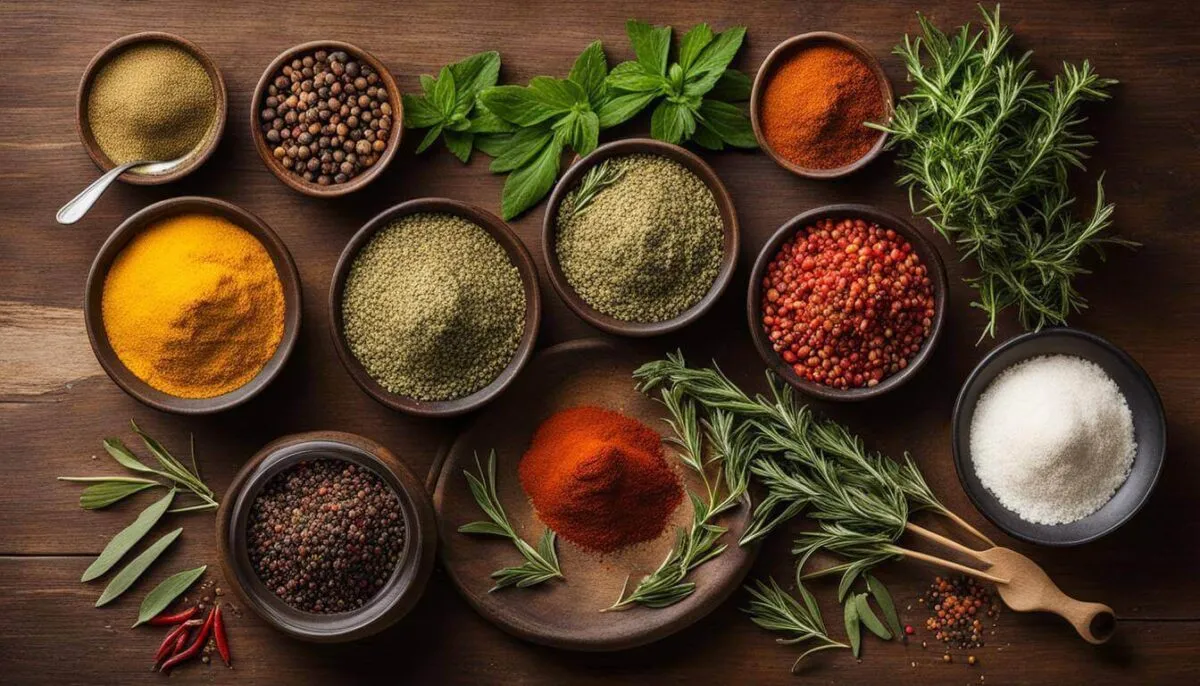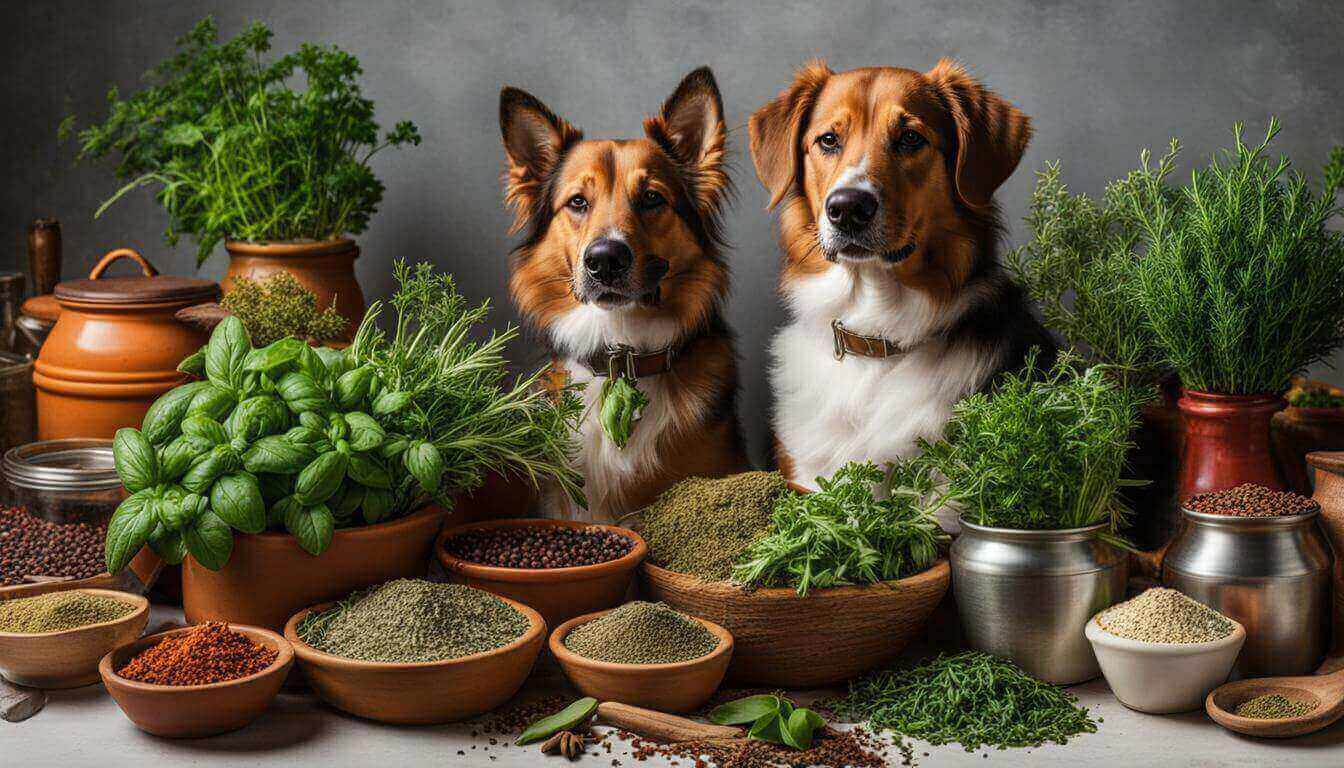If you’re a dog owner, it’s natural to want to spoil your furry friend with treats and tasty food. However, it’s important to know what seasonings are safe for your dog to eat. While certain herbs and spices can be beneficial to your dog’s health, others can be harmful or even toxic.
So, what seasonings can dogs have? Let’s take a closer look at the herbs and spices that are safe for your furry friend to enjoy.
A dog sitting on a pile of fresh herbs, surrounded by various pots and jars of spices. The dog looks content and happy, with a wagging tail and relaxed body language. The herbs have different looks and are easy to recognize. They have bright colors and textures that go well together. Some of the herbs could include rosemary, thyme, parsley, and basil. The pots and jars of spices are also varied and recognizable, with labels showcasing each one’s unique flavor and health benefits for dogs. The overall color scheme is earthy and natural, with warm browns and greens dominating the image.
Herbs can be a great addition to your dog's diet. Some safe herbs for dogs include ginger, basil, and dill seed. Ginger can improve digestion and reduce nausea. Basil has anti-inflammatory properties. Fresh herbs like parsley and thyme can also be beneficial for your dog's health.
When it comes to spices, sweet basil and pumpkin spice can be safe options for dogs in small amounts. However, it’s important to avoid using onion powder, cocoa powder, and English pennyroyal, as these can be toxic to dogs.
When seasoning your dog’s food, it’s best to stick to natural ingredients and avoid processed or packaged seasonings. One option is to use coconut oil, which not only adds flavor but also has potential health benefits for your furry friend. Another option is to make homemade dog food seasoning using ingredients like golden paste.
Overall, it’s important to be mindful of what seasonings you’re using in your dog’s food. By sticking to safe herbs and spices and avoiding toxic ingredients, you can help keep your dog healthy and happy.
Safe Herbs and Spices for Dogs
You can give your pet herbs and spices to improve their health and add flavor to their food. Here are some safe options to consider:
Ginger
Ginger is known for its anti-inflammatory properties and can help soothe upset stomachs in dogs. It can also help with joint pain and arthritis. You can add fresh grated ginger or ginger powder to your dog’s food in small amounts.
Basil
Basil is full of essential nutrients, including vitamins A and K, and is a great antioxidant. Fresh basil is a safe option for dogs and can add some flavor to their meals.
Fresh Herbs
Fresh herbs like parsley, oregano, and thyme can be added to your dog’s food to provide some extra nutrients. They can also help freshen your dog’s breath. Just be sure to use them in moderation and chop them finely.
Sweet Basil
Sweet basil is a safe and tasty option for dogs. It is rich in antioxidants and can help with digestion. You can add fresh or dried sweet basil to your dog’s food to enhance the flavor.
Dill Seed
Dill seed is a natural source of calcium and can help freshen your dog’s breath. It can also aid in digestion and calm upset stomachs. You can sprinkle a small amount of dill seed over your dog’s food or add it to homemade dog treats.
Pumpkin Spice
Pumpkin spice is safe for dogs in small doses and can add some tasty variety to their food. It can also help with digestion and provide some extra nutrients. You can sprinkle a small amount of pumpkin spice over your dog’s food or add it to homemade dog treats.
Before giving your dog any new herbs or spices, always check with your vet to make sure they are safe. Use these seasonings as a complement to a balanced and nutritious dog food diet.
Potential Risks and Toxic Ingredients to Avoid
Adding herbs and spices to your dog’s food can be healthy, but watch out for harmful ingredients. Here are some ingredients to avoid:
| Ingredient | Potential Risks |
|---|---|
| Onion powder | Can cause anemia and damage to red blood cells when consumed in large amounts. |
| Cocoa powder | Contains theobromine, which can be toxic to dogs and cause vomiting, diarrhea, seizures, and even death in severe cases. |
| English Pennyroyal | Considered one of the most dangerous herbs for dogs, it can cause liver failure and ultimately lead to death. |
It’s also important to note that some herbs and spices that are safe for humans can be dangerous for dogs. Examples include garlic, nutmeg, and cinnamon in large quantities. Stick to herbs and spices safe for dogs. Consult with a pet nutritionist or veterinarian before adding new ingredients to your dog’s diet.
Remember, the health and well-being of your furry friend should be a top priority. Always do your research and consult with a professional before making any significant changes to your dog’s diet.
Tips for Seasoning Dog Food Safely
Seasoning your dog’s food can be a great way to add flavor and nutrition to their diet. However, it’s important to do it safely and responsibly to avoid any potential health risks. Here are some tips for seasoning your dog’s food safely:
Use Coconut Oil
Coconut oil is a great option for seasoning your dog’s food. It has many nutrients and can improve digestion, skin, coat, and the immune system. It’s also a tasty addition to your dog’s meals. Just be sure to use it in moderation to avoid adding too many extra calories to your dog’s diet.
Try Golden Paste
Golden paste is another excellent seasoning option for dogs. It’s made from turmeric, which has powerful anti-inflammatory properties. This makes it a great choice for dogs with joint pain or other inflammatory conditions. Golden paste can also promote healthy digestion and help prevent cancer. You can easily make it at home by mixing turmeric powder with coconut oil and black pepper.
Make Your Own Homemade Dog Food Seasoning
If you’re feeling adventurous, you can try making your own homemade dog food seasoning. This allows you to control the ingredients and ensure that everything is safe and healthy for your pup. Some popular ingredients for homemade dog food seasoning include parsley, oregano, sage, and thyme. Just be sure to avoid any toxic ingredients, such as onion powder or garlic.
Consult with a Veterinarian or Pet Nutritionist
If you’re unsure about what seasonings to use or how much to add to your dog’s food, consult with a veterinarian or pet nutritionist. They can give you expert advice and suggest safe and healthy seasonings for your dog. They can also help you create a balanced and nutritious diet plan for your furry friend.
Remember, seasoning your dog’s food can be a great way to add variety and nutrition to their diet. Just be sure to do it safely and responsibly, and always consult with a professional if you have any doubts or concerns. Your pup will thank you for it!

Create an image of various herbs and spices commonly used to season homemade dog food. Show different herbs and spices in separate bowls, with labels indicating their names. There should also be a wooden spoon and a measuring cup in the scene, as if someone is about to mix the seasonings together. The overall feel of the image should be natural and rustic, with a focus on the fresh ingredients that make up the seasoning.
Tips for Seasoning Dog Food Safely
Now that you know which herbs and spices are safe for your furry friend, it’s time to start seasoning their food! Here are some tips to keep in mind:
1. Use Coconut Oil
Coconut oil is a great option for adding flavor to your dog’s food while also providing them with some health benefits. It can help with digestion, improve their coat, and boost their immune system. Simply add a small amount to their food and mix well.
2. Try Golden Paste
If you’re looking for a homemade dog food seasoning, golden paste is a popular option. It’s made from turmeric, which has anti-inflammatory properties and can help with joint pain. There are plenty of recipes available online to make your own golden paste at home.
3. Consult with a Pet Nutritionist
If you’re unsure about what seasonings to use or how much to use, consider consulting with a pet nutritionist. Based on your dog’s needs and restrictions, they can give you personalized recommendations.
4. Gradually Introduce New Seasonings
When adding new herbs or spices to your dog’s diet, do so gradually. This will allow their digestive system to adjust and ensure that they don’t have any adverse reactions. Start with a small amount and gradually increase over time.
5. Avoid Over-seasoning
While seasonings can make your dog’s food more flavorful, be careful not to overdo it. Too much seasoning can upset their stomach or even make them sick. Stick to the recommended amounts and always err on the side of caution.
With these tips in mind, you can safely and effectively season your dog’s food using herbs and spices. You can make your own seasoning for dog food to add variety to their diet. Talking to a pet nutritionist can make sure they get the right nutrients. Give it a try and see how your furry friend responds!
FAQ
What seasonings can dogs have?
Dogs can safely consume a variety of herbs and spices that provide flavor and potential health benefits. However, it’s important to avoid certain toxic ingredients. Here are some safe seasonings for dogs:
What are some safe herbs and spices for dogs?
There are several herbs and spices that are safe for dogs to consume. Some examples include:
- Ginger: can help with digestive issues and nausea.
- Basil: provides antioxidants and has anti-inflammatory properties.
- Fresh herbs: such as parsley and cilantro, can add freshness to their meals.
- Sweet basil: a safe option for dogs, adding flavor to their food.
- Dill seed: can aid in digestion and freshen breath.
- Pumpkin spice: a blend of spices that can be used in moderation for added flavor.
What are some potential risks and toxic ingredients to avoid when seasoning food for dogs?
While some seasonings are safe for dogs, there are certain ingredients that should be avoided as they can be toxic and harmful. Here are some examples:
- Onion powder: can cause anemia and damage red blood cells in dogs.
- Cocoa powder: contains theobromine, which is toxic to dogs and can lead to various health issues.
- English pennyroyal: a type of mint that can be toxic to dogs if ingested in large quantities.
What are some tips for seasoning dog food safely?
When seasoning dog food, it’s essential to do so in a safe and measured manner. Consider these tips:
- Using coconut oil: provides healthy fats and a subtle flavor enhancer.
- Golden paste: a mixture of turmeric, black pepper, and coconut oil that can support joint health and add flavor.
- Homemade dog food seasoning: consider creating your own seasoning blends using safe herbs and spices.
Why is it important to use safe herbs and spices for dogs?
Using safe herbs and spices ensures that your dog’s diet is free from potentially harmful ingredients. It allows you to enhance their meals with flavors they will enjoy while providing potential health benefits. But it’s always a good idea to talk to a pet nutritionist or vet about your pet’s diet.
